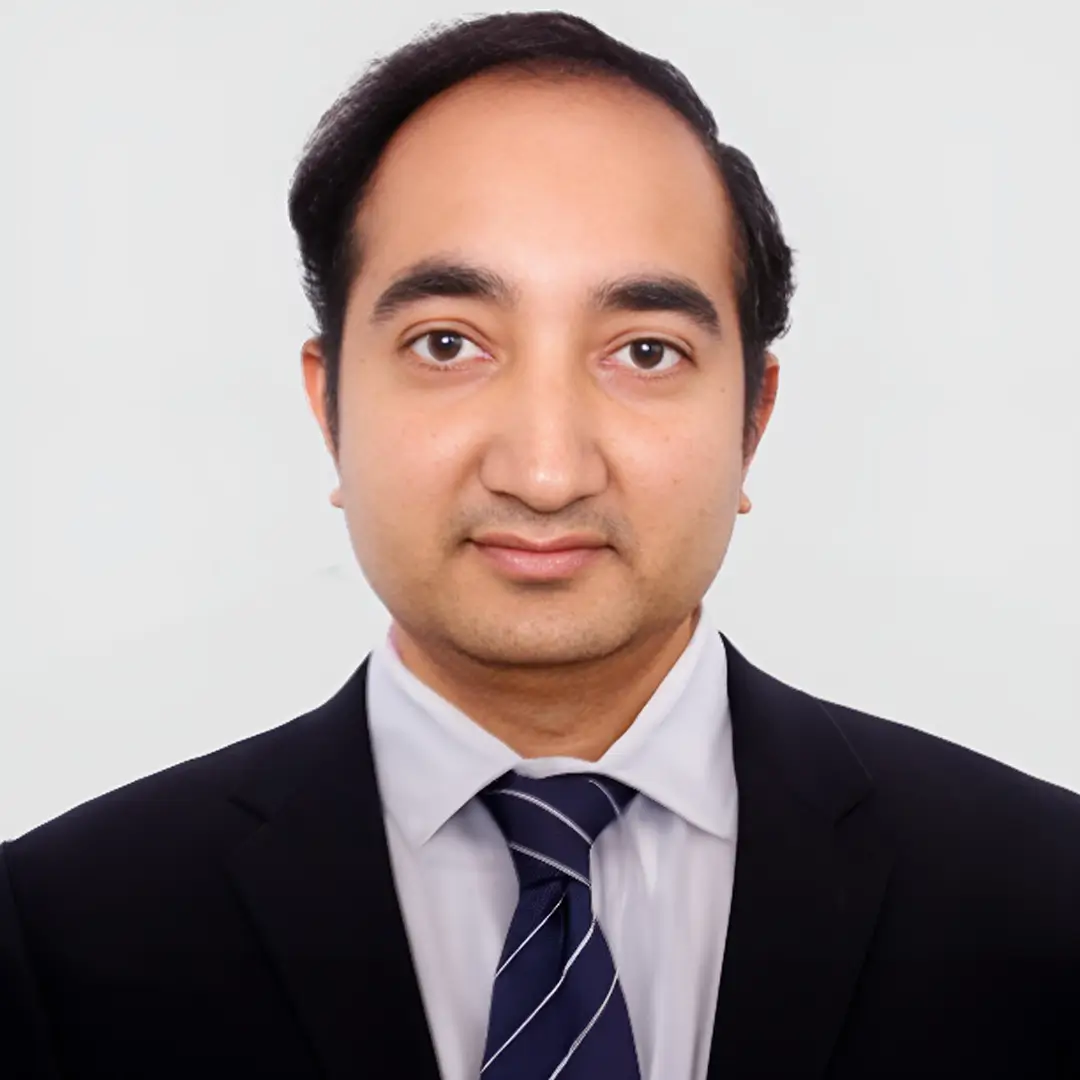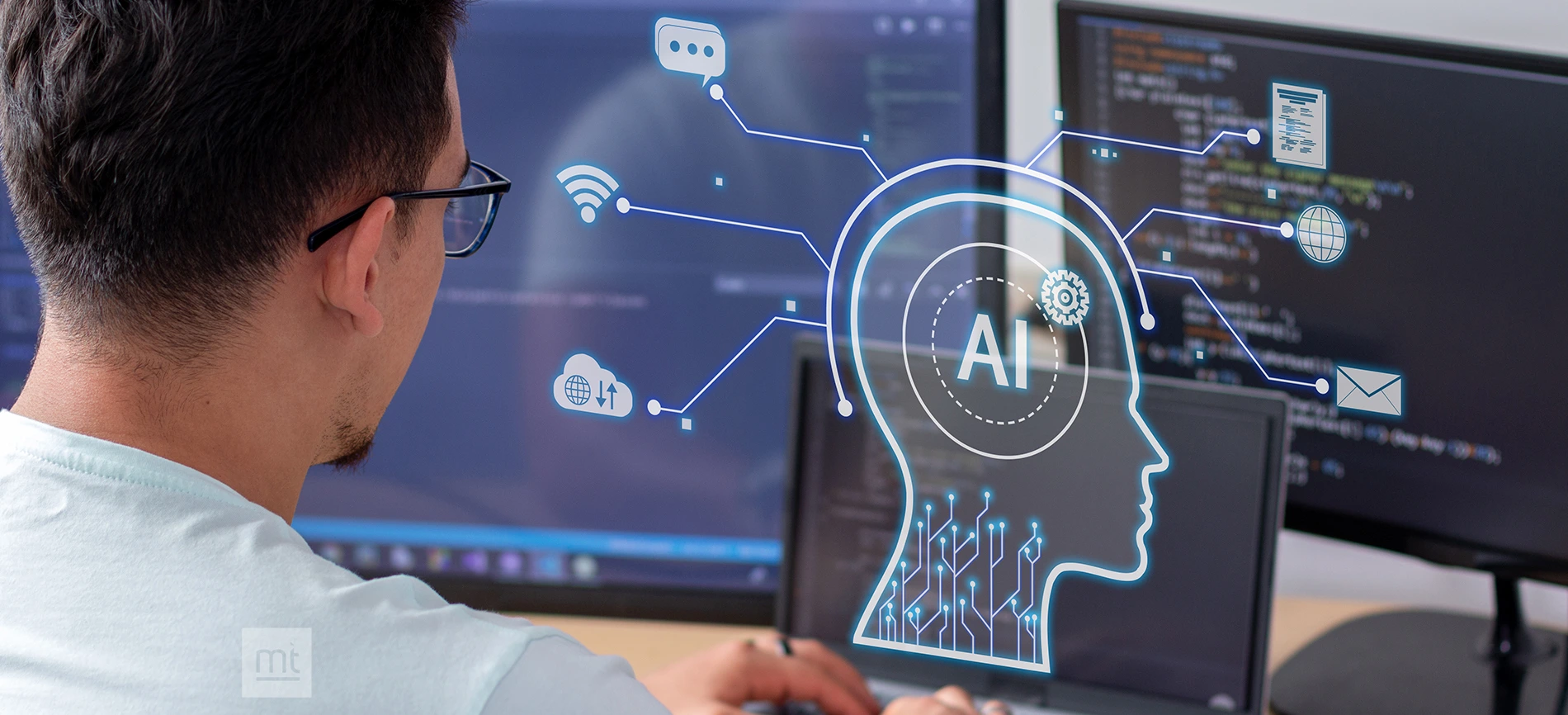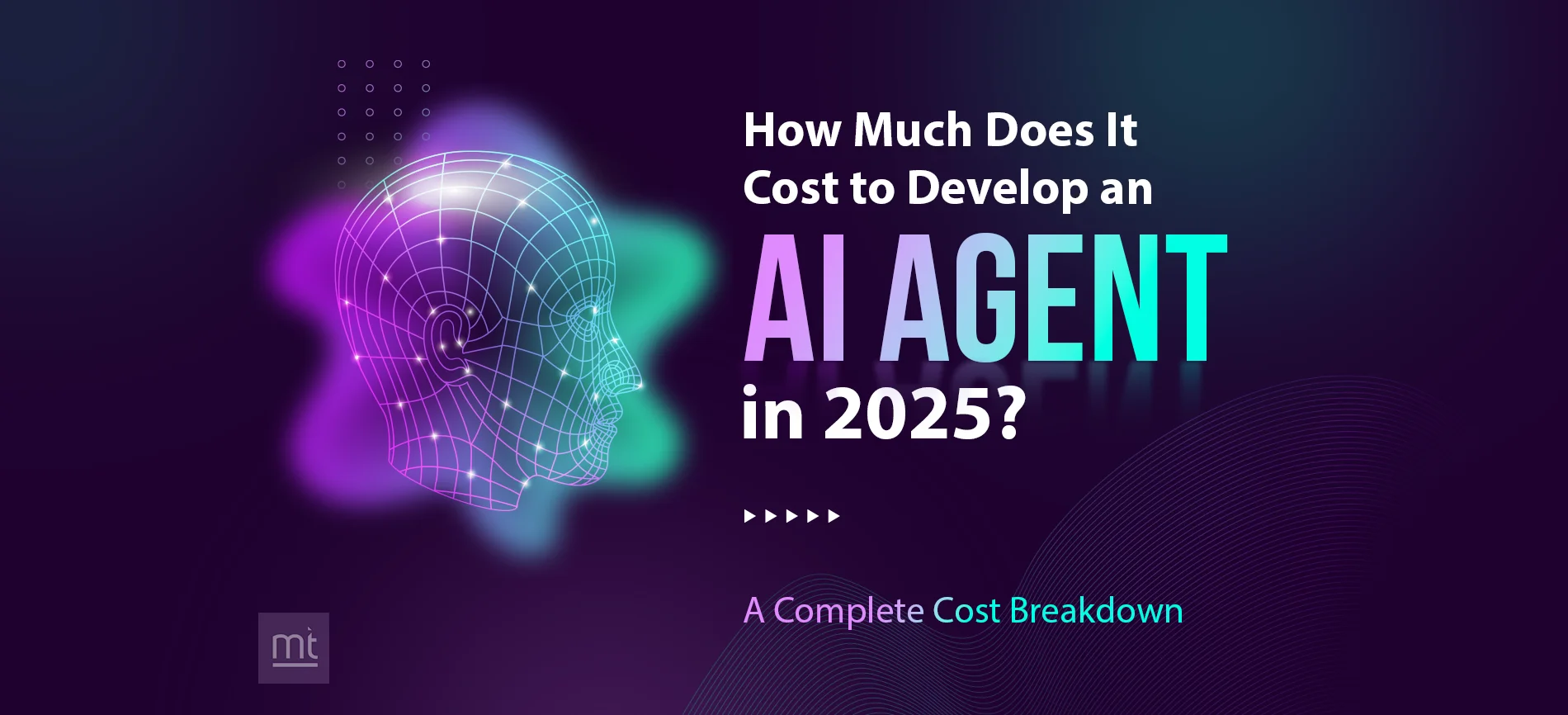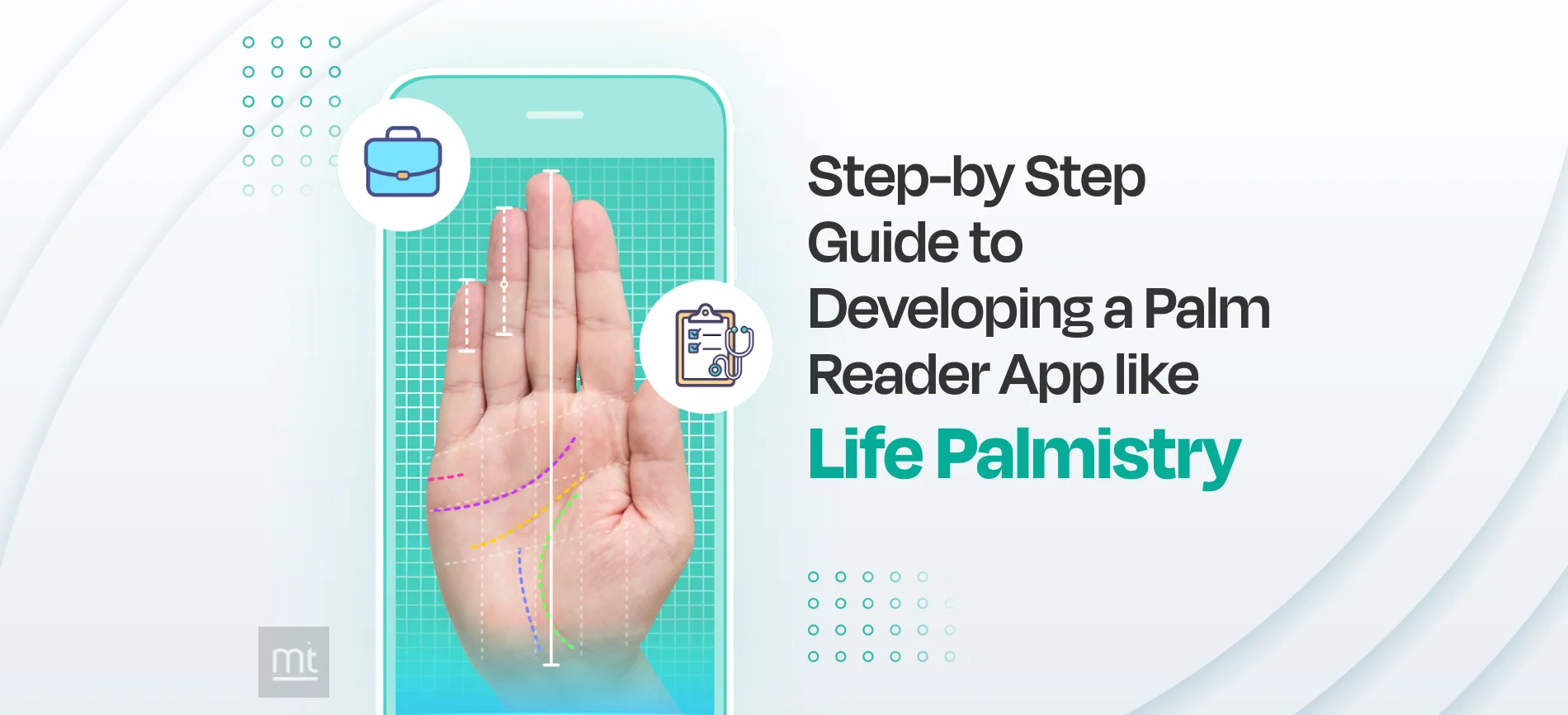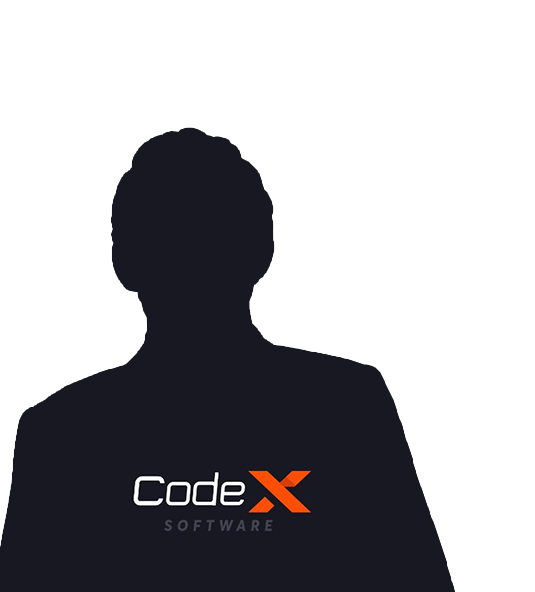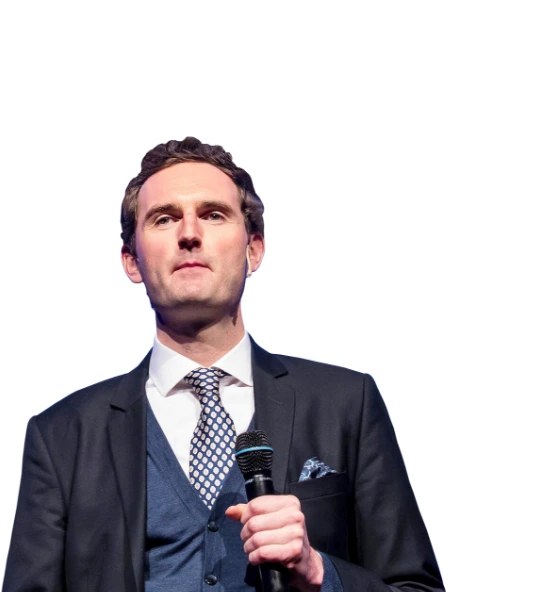Get Free Trial Week Developer Access, Try Before You Hire. Click Here to Claim Now
Introduction:
AI is one of today’s most impactful technologies, and while it’s revolutionizing every sector, healthcare might be where it matters most. In the UAE—particularly in innovation-driven Dubai, AI is helping doctors diagnose earlier, personalize treatments, and monitor patients remotely. With the global AI healthcare market forecast to hit $187.69 billion by 2030 and 90% of hospitals expected to use AI by 2025, the role of AI in Healthcare is undeniable. Among the top trends is AI-powered medical imaging, which is changing how healthcare providers detect and treat diseases. This blog is about how AI is reshaping healthcare in the UAE—and what it means for the future.
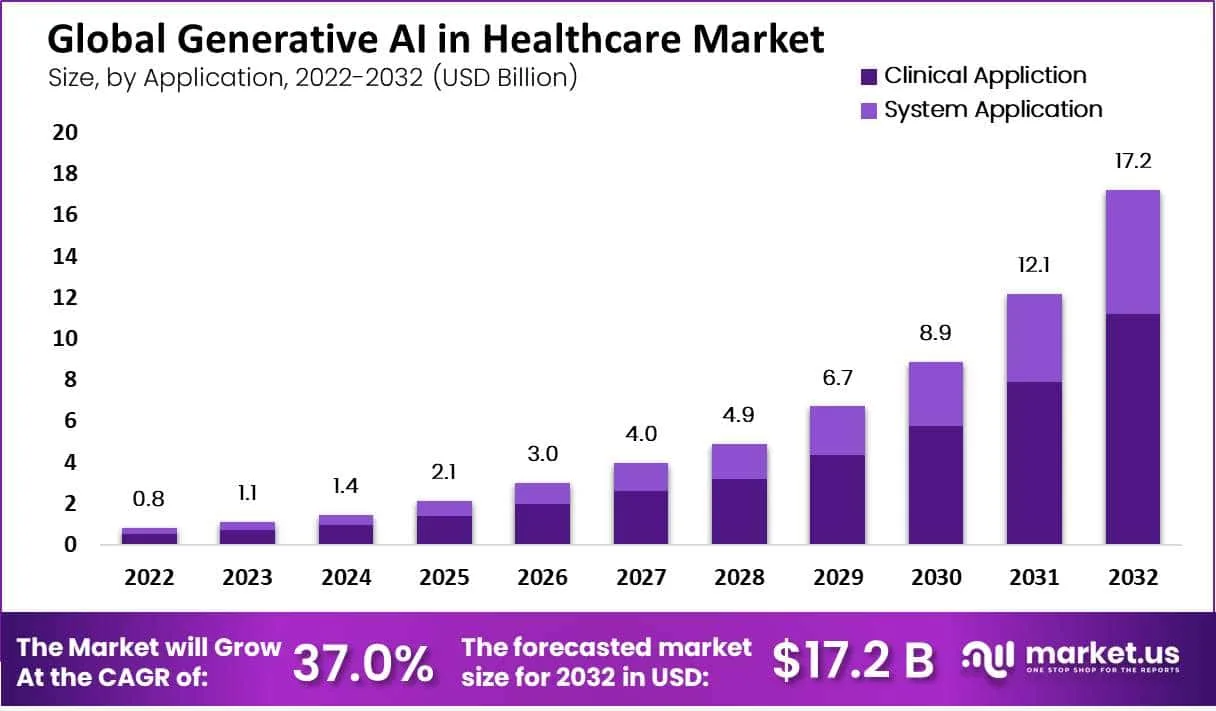
Source: market.us
How AI is Transforming Healthcare in the UAE?
Do you know the UAE is among the top spenders on healthcare in the GCC, using about 5% of its GDP? Let's see how ai is transforming the future of healthcare.
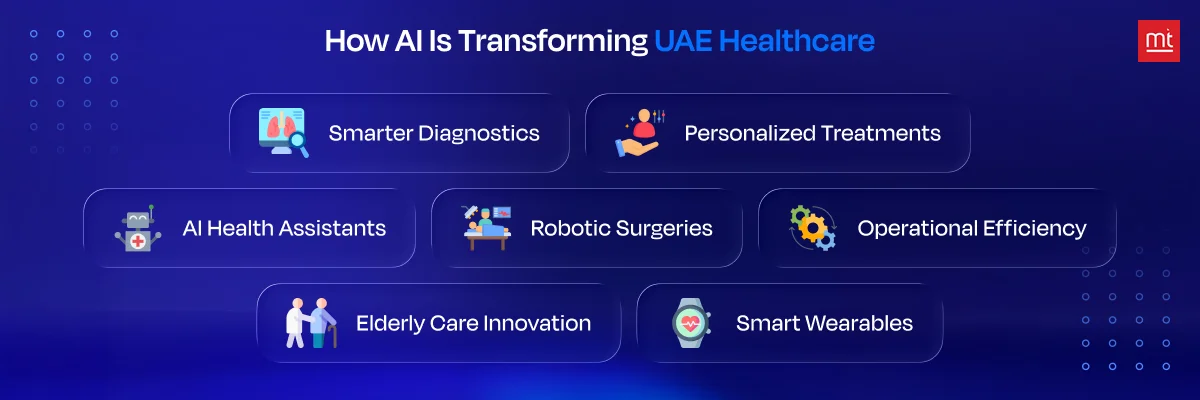
1. Diagnostics and Early Detection
AI is already in use in radiology and pathology across many UAE hospitals. AI tools like IBM Watson, Zebra Medical Vision, and Google’s DeepMind models help in interpreting X-rays, MRIs, and pathology slides to detect diseases like cancer, strokes, and even COVID-19.
This helps patients to get prompt treatment and increase recovery rates by eliminating errors and delays.
2. Personalized Medicine
AI in Personalized medicine is currently emerging in the UAE’s healthcare industry. AI analyzes genetic and health data to assist doctors in developing individualized treatment plans. AI enables personalized care as it helps determine how each patient responds to particular treatments. Doctors in the UAE have found this method useful for obtaining better results with less hit and miss in terms of prescribing medications, for chronic or difficult-to-treat conditions.
3. Virtual Health Assistants and Chatbots
Dubai uses AI chatbots through Dubai Health Authority (DHA), such as “Doctor for Every Citizen,” which are used for telehealth, booking of appointments, and answering basic health questions. Other hospitals have also added their own chatbots to their apps and websites. This helps to reduce staff stress and manage patients to access services in a timely way.
4. Robotics and Automation in Surgery
Currently, UAE hospitals like Cleveland Clinic Abu Dhabi and Mediclinic are using robotic surgery systems with the help of the Da Vinci Surgical System. This system has a 3D camera and four robot arms with surgical instruments. A doctor can control the arms' movement from the computer console and see a real-time, high-definition view on the screen.
5. Operational Efficiency
A lot of smart hospitals in Dubai have started to use AI in hospital management, such as visiting schedules, patient management, bed availability, and many others. For example, Mediclinic Parkview Hospital is using InterSystems TrakCare for its patient care solutions. It automates the plan and resource schedule & reservation, and assigns a doctor team, based on the health data of a patient.
6. AI in elderly Care and Living
The UAE is making an investment in this, but it is not yet the standard of care for all healthcare facilities. There are pilot programs and smart home setups with AI-based monitoring to monitor vital signs, identify falls, and track chronic conditions.
This will be useful for caregivers or doctors as the app immediately notifies them if an emergency is detected by the smart systems.
7. AI in Wearable Healthcare Technology
Wearable technology has completely changed the way how people in the UAE manage their health and diet. As most of the Dubai population uses wearables like Apple Watch, Fitbit, and Huawei devices, healthcare providers in the UAE can easily integrate wearable data to check heart rate, blood pressure, calories, glucose levels, and more to monitor the patient from a remote location.
The Role of AI in Healthcare: UAE’s Most Recent Innovations
Below are some of the top innovations in healthcare of the UAE that are successfully used in today's dates also.
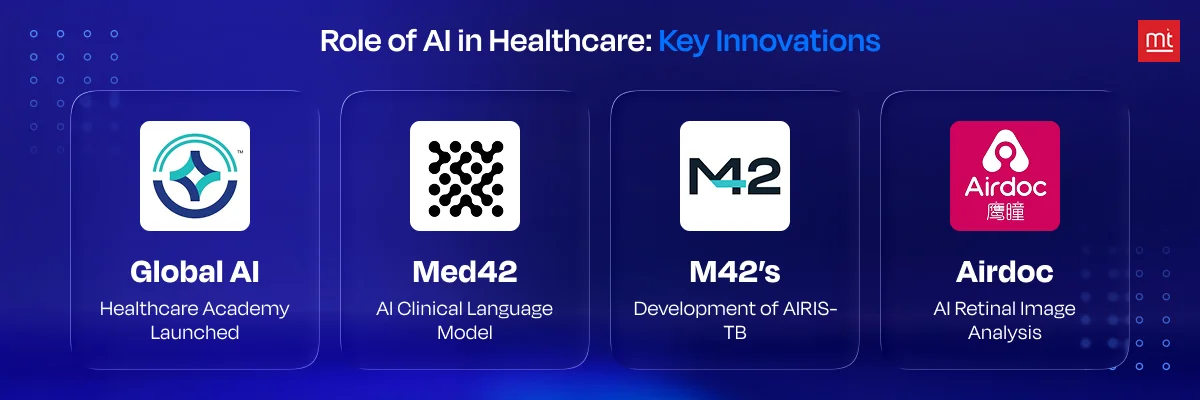
Launch of Global AI Healthcare Academy
In 2024, Abu Dhabi launched the Global AI Healthcare Academy in partnership with Mohamed bin Zayed University of Artificial Intelligence (MBZUAI) and Core42. The reasons behind this launch was to train healthcare professionals to use AI and increase AI adoption in healthcare.
Med42’s Al Clinical Language Model
Med42 is a health-tech company based in Abu Dhabi that has built an AI model similar to GPT-4 and Med-Gemini. This innovation is built for healthcare applications to assist with medical queries, documentation, and clinical decision support. And to help doctors with fast information and better patient care.
M42’s Development of AIRIS-TB
M42 developed AIRIS-TB, an AI-powered system that reads and analyzes chest X-rays to detect tuberculosis (TB). It can process 2,000 images a day and reduces radiologists’ workload by 80%. This is changing TB detection in the UAE, faster diagnosis, more efficient screenings, and better public health response, especially in high-volume healthcare environments.
Airdoc’s Al Retinal Image Interpretation System
Airdoc’s Al Retinal Image Interpretation System is not available yet, but it’s part of the growing use of AI in diagnostics in the UAE. By integrating such tools, doctors can detect eye diseases early by analyzing retinal scans with high accuracy.
Real-Life Applications of AI in UAE Healthcare You Should Know
Along with a mobile app development company, many universities and hospitals in the UAE are actively using AI in healthcare. Below are some real-world case studies showing how AI is improving patient care.
#1. Fakeeh University Hospital in Dubai uses AI for Patient Monitoring
Fakeeh University Hospital in Dubai is currently using various AI-powered systems to continuously monitor patients’ vital signs in real time. It has also partnered with Dubai-based healthcare company “Prognica Labs”. Researchers also say that this vision aligns with the vision of Saudi 2030.
These tools alert medical staff to any early signs of deterioration, give a faster response, and provide preventive care. The AI system integrates with electronic medical records and reduces unnecessary hospital visits and stays.
#2. King's College Hospital Utilizes AI for Robotic Surgery.
King’s College Hospital in Dubai uses AI-assisted robotic systems to perform surgery with perfection for urology, orthopedics, neurology, and other sensitive procedures. These robotic arms are guided by AI algorithms for better control, to reduce blood loss, and for faster patient recovery.
#3. NABIDH’s Health Exchange uses Predictive Analytics to find Disease.
This AI-powered predictive analytics tool identifies disease trends across the population. By analyzing large volumes of patient data, the system flags potential health risks, helping doctors act earlier. For example, it can predict the onset of diabetes or heart disease in at-risk individuals. This data-driven approach improves population health management and supports proactive, rather than reactive, healthcare.
#4. Insilico Medicines for AI-generated Drug
AI has the potential to discover a useful drug by analyzing the biological dataset. Insilico is the leading biotech company in UAE, which uses AI to design and test new drugs. This company uses biological data to predict the effectiveness of the drug on specific medical conditions to refine the drug manufacturing process.
What are the Challenges and Ethical Considerations while using AI in UAE healthcare?
As AI is highly reliant on user data, there are also some limitations and ethical considerations to keep in mind.
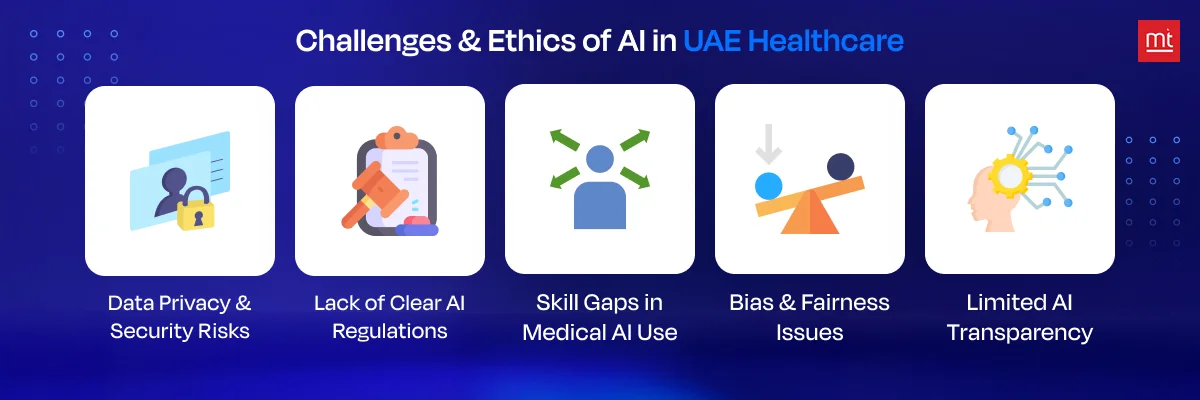
1. Data Privacy and Cybersecurity Concerns
AI handles sensitive patient data, so it’s a big deal. In the UAE, data storage is key. Hacking or data breaches can be a challenging thing to handle with the huge data. This can be solved by using strong cybersecurity frameworks, compliance with data protection laws like the UAE’s PDPL, and regular system audits.
2. Need for Regulation and Ethical AI Usage
AI must align with medical standards and national laws. Lack of clear healthcare-specific AI regulations may lead to misuse or patient harm. Currently UAE is working on AI governance, ethical frameworks, and partnerships with academic institutions like MBZUAI to guide safe AI use in healthcare.
3. Skill Gaps and Training for Healthcare Professionals
AI tools only work if medical staff know how to use them. As the healthcare people are from a non-tech background, Many healthcare professionals don’t have AI training. This can be solved by offering structured AI education through initiatives like the Global AI Healthcare Academy in Abu Dhabi and in-hospital training programs for doctors and nurses.
4. Bias and Generalization Challenges
Biased predictions can affect diagnosis and treatment decisions. Sollution is to use diverse, local patient data to train models and conduct regular system audits and regular audits and regular audits to detect and reduce bias and ensure fair and inclusive healthcare.
5. Lack of Transparency
AI is still emerging in healthcare, hence doctors and patients may hesitate to trust AI recommendations. This can be solved by developing explainable AI models that provide clear insights into how decisions are made to make healthcare people trust in clinical settings.
How to Implement AI in Healthcare?
Implementing AI in healthcare needs the right tools and technologies, and that can only be decided when you have clear goals. Here are the steps to do so,

Step 1: Define Objectives and Use Cases
Every healthcare organization is different and has different objectives for developing AI solutions for healthcare. It's important to know the problems of healthcare, whether it's operational inefficiencies, diagnostic problems, personalized treatment gaps, or online consultation. Knowing the purpose behind implementing AI for healthcare will help decide the suitable tools and tech stacks.
Step 2: Choose the Suitable AI Technologies
The right technology depends on what you want to improve—patient care, operations, or research—and how complex your systems are. Choose from NLP, ML, deep learning, and other AI technologies that best align with your long-term goals, organization’s needs, solve patients' problems, and fulfill resource needs.
Step 3: Integrate AI with the Current System
Once the AI tool is finalized, integrate the tool or APIs with patient records, workflows, and communication to stay connected.
Step 4: Train your Healthcare Professionals to use it
AI tools are only useful if your doctors, nurses, and staff know how to use them. Hence, it's important to provide training sessions so they can understand the system and trust it. This builds confidence, reduces errors, and helps teams work with AI as a helpful assistant.
Step 5: Test AI Solutions
Before making the AI solutions live, test the AI system in real scenarios to check how well it performs. Run pilot programs or trial cases to see if it accurately meets your goals. This will help catch any bugs or issues early and ensure everything works as expected for both patients and staff.
Step 6: Performance Monitoring and Optimization
It's not over yet after deploying the AI solutions. Regularly monitor the results, client feedback, and patient results. Based on what you learn, do the additional revision and make improvement. In this way, it guarantees the AI still works properly, is flexible with changes, and is useful for a longer period in the healthcare field.
Conclusion
The UAE is setting the global benchmark for healthcare with its AI adoption. Whether it’s early disease detection or virtual consultations, AI is making a real difference for providers and patients alike. From smart hospitals in UAE to AI-powered diagnostics, AI in healthcare is more than a trend—it’s a revolution.
Understanding what is the role of AI in healthcare is crucial to make useful AI apps. As a top AI ML development company, we deliver smart healthcare solutions that improve outcomes, streamline workflows, and support digital transformation. If you are someone looking to build an AI healthcare app, contact us at Manektech, and we will guide you on everything from scratch.
FAQ:
1. Is AI Replacing Doctors in the UAE?
No, AI can never replace doctors because it can only assist and support doctors with various healthcare tasks like patient monitoring, diagnostics, automating work, and more. Advanced AI technologies help to detect medical conditions like cancer and more, but will never replace doctors, no matter how much it gets evolve.
2. How much does it Cost to Implement AI Solutions in Healthcare in the UAE?
The cost of AI App Development Services can depend on the size of the project, the complexity of features/functionality, required integrations, and many other things.
Entry-level AI solutions can cost up to $25,000, while enterprise-level AI solutions can go up to $250,000 or even more.
3. How long does it take to Integrate AI into a Healthcare System or Hospital?
Integrating AI solutions into healthcare requires planning, testing, and training. Hence, the time to integrate AI solutions into any healthcare system or hospital depends on hospital size, existing technologies, training required for staff.
4. What are the Benefits of Using AI in UAE Healthcare?
AI in UAE healthcare helps with a lot of things, so basically it has a lot of benefits. Here they are:
- Firstly, it reduces a lot of admin burden by reducing the paperwork.
- Predictive analytics can be useful to predict health risks by analyzing a patient's medical history.
- Doctors can focus on patients by automating other tasks.
- Doctors can suggest better treatments using data analytics.
- AI can diagnose the disease early without human error.
Recommended Blogs
Subscribe to Our Newsletter!
Join us to stay updated with our latest blog updates, marketing tips, service tips, trends, news and announcements!


